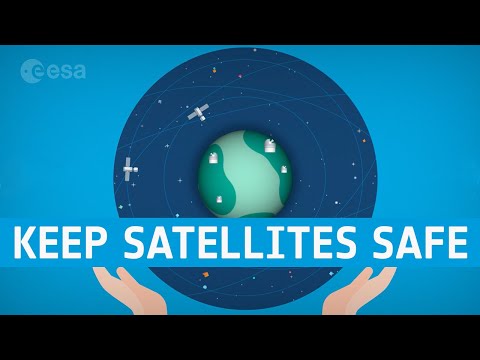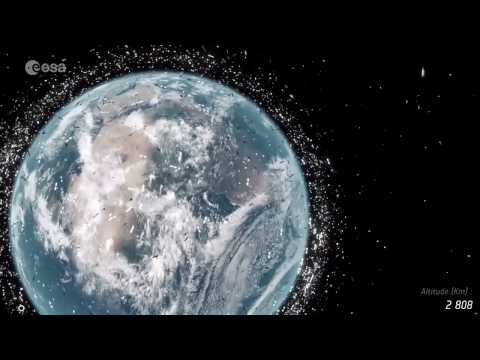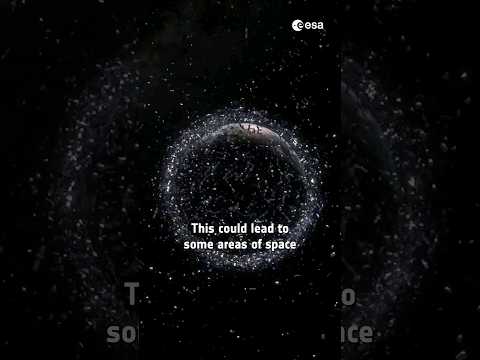Time to Act
The launch of Sputnik, humankind’s first satellite, in 1957 marked the dawn of a new era for the people of the ‘Pale Blue Dot’.
Decades later, our planet is now surrounded by spacecraft carrying out extraordinary work to study our changing climate, save lives following disasters, deliver global communication and navigation services and help us answer important scientific questions.
But these satellites are at risk. Accidental collisions between objects in space can produce huge clouds of fast-moving debris. These clouds can spread and damage additional satellites with cascading effect, eventually making the most useful orbits around Earth no longer safe for spacecraft or people.
Satellites today have to carry out collision avoidance manoeuvres to avoid possible impact with debris. These are costly, and hundreds of collision avoidance alerts are already issued every week. [add para space}
And this is nothing compared to what is coming. Several companies have begun to launch mega-constellations into low-Earth orbit to provide global internet access. They have great benefits, but could be a source of huge disruption if we do not change our behaviour.
Our current methods for avoiding collisions in space will become inadequate in just a few years – and even compliance with space debris mitigation guidelines may no longer be enough.
It’s time to act.
ESA is developing technologies for an automated collision avoidance system, as well as methods for refuelling, repairing and upgrading satellites in orbit, extending the lifetime of missions and potentially reducing the number of new satellites that need to be launched.
ESA is also working on debris removal missions that will fly up to dead spacecraft and debris objects, capture them and move them to safety – either by sending them down to burn up in Earth’s atmosphere or up into ‘graveyard orbits’.
By reaching into space, we have brought huge benefits down to Earth, providing technologies that enrich our societies, connect people in previously unimaginable ways and give us an incredible perspective and understanding of our planet.
We know what will happen if we continue on our current path, but we also know exactly what we need to do to change that fate and ensure humankind’s access to space is guaranteed for future generations.
Find out more: https://space-debris-conference.sdo.esoc.esa.int/
This video is also available in:
French: https://youtu.be/8MLu6CgfTe0
German: https://youtu.be/Fbg9S9og-u8
★ Subscribe: http://bit.ly/ESAsubscribe and click twice on the bell button to receive our notifications.
Check out our full video catalog: http://bit.ly/SpaceInVideos
Follow us on Twitter: http://bit.ly/ESAonTwitter
On Facebook: http://bit.ly/ESAonFacebook
On Instagram: http://bit.ly/ESAonInstagram
On Flickr: http://bit.ly/ESAonFlickr
We are Europe’s gateway to space. Our mission is to shape the development of Europe’s space capability and ensure that investment in space continues to deliver benefits to the citizens of Europe and the world. Check out https://www.esa.int/ to get up to speed on everything space related.
Copyright information about our videos is available here: https://www.esa.int/ESA_Multimedia/Terms_and_Conditions
#ESA
#TimeToAct
#SpaceDebris





 #shorts
#shorts
ESA




This is going to turn into the "Planetes" anime soon.
Spacedebris is a very important topic and I can't understand why we don't talk more about it. Thank you for making this informative video! Hopefully this will bring more attention and awareness to the spacedebris problem!
Perhaps some day we agree on an international space debris act. For each 1 kg mass reaching to the orbit, sender to should confirm 1,1 kg worth of space debris mitigation. Perhaps 0,1kg worth of funds should be sent to the clean space office, and rest of that mass should be mitigated by the lifetime of the craft.
Big guys should clean up their own mess first before giving me a guilt trip for a service they've charged me for.
Have at it as long as you are not gonna try and blame this on my straws or plastic bags 0.o
Heart


Very interesting project!
Future generations need the Access to Space more than we do.
automated (drone) space craft are definitely a part of the future solution. but at the same time once these AI drones get enough AI you might be lo9king at the Terminator (movie) in space.
Actually Australian Private Company (EOS) Has Already Developed A Laser to Destroy Space Debris